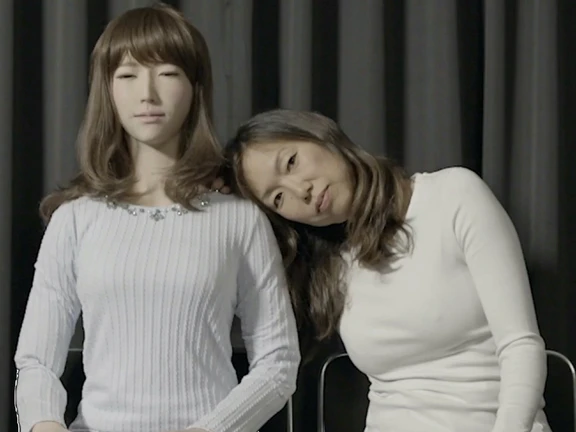




Dir: Ann Shin | Doc Canada, 74’
If you could create an immortal version of yourself, would you?
Don’t be put off by its tricksy title, this new documentary from award-winning Toronto-based Korean filmmaker Ann Shin is fascinating from start to finish.
A.rtifical I.mmortality opens with a welter of technical experts fast-talking their way through their ground-breaking research. But the focus soon narrows on Shin, best known for her HBO title The Defector: Escape from North Korea, who is now working on how to capture the essence of her dying father who is rapidly sliding down the slippery slope of dementia. Is there a way to keep part of him alive, and leave something of herself for her own kids to reflect on? – she ponders while chopping away at those ubiquitous veg in her kitchen?.
Apparently there is. And Shin showcases each new discovery in a film that uncovers the cutting-edge world of AI: “what is it that makes us uniquely human, and cannot be recreated by a robot, however sophisticated?. The film’s first episode is possibly the least plausible and most confusing: we meet Lincoln Cannon, a leading proponent of the ‘Trans humanist Movement’ which believes in the ‘ethical use of technology to transcend human limits, even making death “optional”.’ Is this a load tosh, you may wonder? Well, watch on, it does get better.
What follows is a deep dive into the realms of artificial intelligence, machine learning and biotechnology. Shin interviews specialists from the world of religion, robotic science, technology, philosophy and neuroscience.
She 52 year old mother of two then explores ‘mind-files’. Facebook and Twitter all possess these intensely personal impressions of us from the social posts that we share with them. So what if these could be downloaded onto a personal file and then uploaded and stored privately for our benefit on an avatar?. She talks to Dr Deepak Chopra has already created his own “digital Deepak” from his mind-file. The idea is to pass on the essence of himself and his accumulated knowledge for his grandkids.
Mind files can also be used for Chopra’s own commercial benefit, as a virtual mentor and guru. He explains the difference between this unique personal version and, say, Siri. With your digital avatar you have a direct relationship with that tailored made ‘person’. It can interpret your own feelings based on a personal knowledge bank, created by you in an AI version of yourself that you compile well before you die.
Meanwhile in California, Profesor Alysson Muotri has found a way to replicate actual human brain cells in a petri dish using stem cellls known as organoids. These can produce a more complex and nuanced artificial brain material. So sometime in the future brains may be able to grow this material for positive uses, including the treatment of traumatic injury, and even to tackle mental illnesses such as depression or motor neurone disease.
Over in Japan where robots are very much part of everyday life, Hiroshi Ishiguro has pioneered ‘intelligent’ robotics. So lifelike is his own android that it actually fooled audiences into believing it was Ishiguro himself – but that’s possibly because he looks and acts more like an Android than a human, in the nicest possible way.
One of the sceptics of the AI world is neuroscientist Dr Taufik Valiante who has been finding out exactly how memories are made in the brain. Very little is actually known about the brain and how it processes memory. But the significant issue here is how malleable memory is, and how much it is subject to individual and personal reflections. Memories are a ‘loved experience’ with a richness that AI does not have the capability of recording. Human cognition is an “embodied cognition’ far more complex that any AI can replicate. Robots, no matter how sophisticated, can’t smell, feel or touch. How could those elements be replicated by a computer? Taufik heads up a think-tank at the neurological department of Toronto’s Krembil Research Institute and reminds us, reassuringly, that humans are capable of feeling exquisitely subtle qualities including ‘body memory’ that avatars are just not able to sense. This all very encouraging for those fearing a takeover by robots. The Japanese have coined an expression “sonzaikan” that refers to the unique presence of another being. So there’s hope for us real humans yet in the scary world of future intelligence. MT
WARSAW FILM FESTIVAL 2021